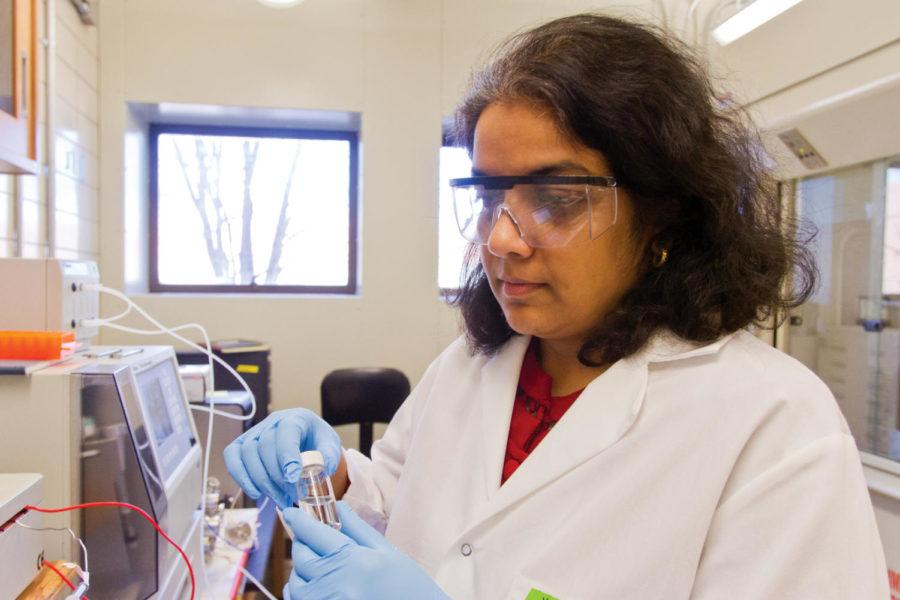ISU teachers nominated for research innovation award
Photo Illustration: Megan Wolff/Iowa State Daily
Surya Mallapragada researches creating materials for drug, gene and vaccine delivery.
November 16, 2012
Many of Iowa State’s women in science and engineering have been nominated to receive Dupont Pioneer Women of Innovation awards for their outstanding work in research and leadership in their communities.
Surya Mallapragada, professor of engineering and chair of the Department of Chemical and Biological Engineering, is a finalist and first time nominee for the Research Innovation and Leadership Award.
Mallapragada’s research included creating and working with materials for optimizing drug, gene and vaccine delivery as well as nerve regeneration and other medical applications.
Colleagues are able to nominate someone they believe deserves the recognition.
The decision of who receives these awards is based on the visibility of the research the nominee does, the impact the work has had on scientific and technological communities, and how the nominee has contributed to the research.
Mallapragada’s work has already won several awards and has been recognized by many different institutions.
Among these awards are the National Science Foundation CAREER Award and the MIT Technology Review TR100.
“I can’t take credit for everything because I work closely with students,” Mallapragada said. “They deserve a great part of the credit.”
Although the award doesn’t provide financial help to the recipients, it allows them the opportunity to be recognized by a wider audience.
According to Mallapragada, the Department of Chemical and Biological Engineering has one of the largest ratios of women faculty and students in the College of Engineering.
“It’s a big point of pride for us, and I think that highlighting successes of women is always a good thing to encourage other women,” Mallapragada said. “Especially K through 12, to follow STEM careers.”
Eve Wurtele, professor of genetics, development, and cell biology, is also a finalist and second time nominee for the Research Innovation and Leadership Award.
Wurtele works in the field of systems biology, particularly on the composition of plants. Her collaboration of researchers uses software in combination with experimental results to predict new genes that regulate cell metabolism and alter cell composition.
Wurtele and her team of computer scientists, cell biologists, writers, musicians and artists have also created a computer game called Metablast that helps the player learn about cell and metabolic biology.
In Metablast, the user is able to travel into a cell to see what a cell’s organelles look like inside and out and ultimately learn in three dimensions.
“The idea is that kids can play this together in small groups, and everybody can start to realize the way everything is integrated together as opposed to one topic,” Wurtele said.
Metablast was made primarily to help high school and college students. Instructors are able to make an account, download the game free of charge, and create their own questions and change settings for gameplay.
Wurtele has previously won awards for her work.
“I think that the two things that I do, looking at regulating cell metabolism and then creating this video game, are pretty unique. We’ve done new things,” Wurtele said. “I’ve developed those particular concepts and lead those teams.”
The unique work that these women have done have not gone unnoticed. Mallapragada said that the innovation awards recognize the achievement of women in science and engineering and that with recognition comes a positive impact on women as a whole.
“I think it [the award] will definitely bring added visibility and show some of the neat things that are going on at Iowa State and highlight that,” Mallapragada said. “This is a special event because it honors women. There are so few women in engineering. It’s nice to have more women recognized.”
Award recipients were announced at the Women of Innovation dinner and awards ceremony Thursday, Nov. 15, at the Des Moines Marriott Downtown.
“When you’re a professor and you’re doing research, it gets used by other people. When you publish results, and other people see those results, and they start doing research based on what you’ve done, that’s a big reward,” Wurtele said. “You feel like you’re making an impact.”







